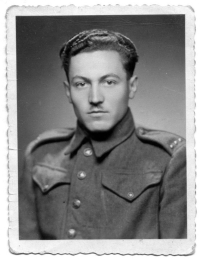I was lying injured in the infirmary and they kept bringing in people from Dukla I couldn‘t listen to the wailing I stole some galoshes, wrapped a rag around my injured leg and I legged it away They removed the shard in Prague, after the war was already over

Stáhnout obrázek
Jiří Švejdar was born on the 24th of May 1922 in Český Boratín, in Volhynia. His father Bedřich made a name for himself as the long-serving mayor of Český Boratín, a courageous diplomat who managed to deal with both the Bolsheviks and the Germans. Jiří Švejdar became orphaned at an early age. When he was eight years old, his mother died from tuberculosis, leaving the family to struggle on alone - the father, Jiří, his brother Miloslav and his sister Lýdie. The Russians wanted to deport his family to Siberia, but, fortunately, they did not have time to put the plan into action. In the spring of 1944, the Soviet Army returned to Volhynia, and the young men of Český Boratín decided en masse to join the 1st. Czechoslovak Army Corps. The volunteers gathered in Mayor Švejdar‘s courtyard. After being conscribed in Luck and going through a short training session, Švejdar was made an artillery observer. His first combat experience was at Torčín - he was yet without uniform. He took part in the fighting at Dukla and in Nižný Komárnik. At the end of the war, the unit was on the borders of Bohemia and Moravia. After a short stay in Prague, he was transferred to the Žatec district. He spent some time in Děkov helping a German widow with farm work. Shortly afterwards, he was given a deportee house in Hrušovany to resettle. But the estate was already taken by the gold-digger Hyngar and his family, who were not planning on leaving. Hyngar attempted to change the official decree right until the last moment, even offering bribes, but to no avail. In the first post-war years, Švejdar received help from his rich uncle Josef Opočenský of Prague, most generous financial aid. Švejdar met his wife-to-be Vlasta Víznerová in Hrušovany, but they later moved to Lipkovice, her hometown. Together they raised two sons and two daughters. Before leaving Hrušovany, Švejdar was „plucked clean“ by the local JZD (United Agricultural Co-op) and had to start anew.

